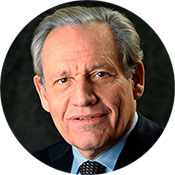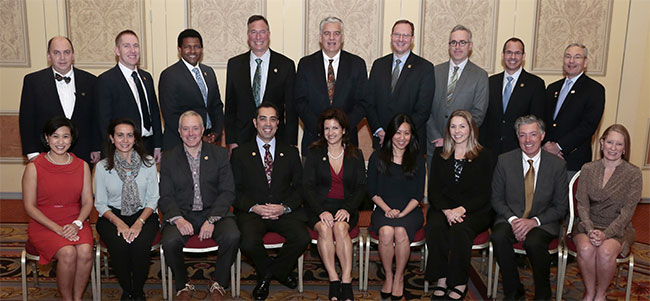Download PDF
WHAT’S HAPPENING
2015 Member Survey Results: Practice Environment
The Academy membership survey is conducted every 2 years to determine general attitudes toward the Academy and satisfaction with ophthalmology as a career, and to gather information on practice demographics and patient services. The data below are from the portion of the survey, conducted by Loyalty Research Center, that focuses on practice environment. The results are based on 1,390 responses (733 domestic, 657 international) collected from a representative sample of the Academy’s membership.
U.S. members. Overall, there has been no change during the past 16 years in the percentage of members who classify themselves as comprehensive ophthalmologists, general ophthalmologists with a subspecialty, or ophthalmologists within a subspecialty. However, there were significant increases in the last 2 years in 2 subspecialties:
- Glaucoma (12% to 20%)
- Oculoplastics and orbit (1% to 10%)
In another leap, the percentage of respondents in a practice that employs at least 1 optometrist full time jumped from 48% to 59% from 2013 to 2015.
Regarding EHRs, member implementation continues to rise, as these systems are present in 75% of practices. Unfortunately, EHRs have not resulted in more productive workplaces: 62% of members say that their EHR has decreased practice productivity. Among ophthalmologists in their first 5 years of practice, however, only 35% cite a decrease in productivity. Overall, only 31% rate the quality of their system as “excellent” or “very good,” 55% rate it as “good” or “fair,” and 14% rate it as poor.
Despite recent regulatory upheaval—such as the transition to ICD-10 and the ongoing challenges of the PQRS and meaningful use programs—satisfaction with ophthalmology as a career is at an all-time high. Nearly 9 out of 10 members are “extremely satisfied” or “very satisfied” with their career choice. Notably, the increase in satisfaction is most apparent among subspecialists.
Going forward, domestic members are looking to the Academy to continue to focus on advocacy and specific legislative and regulatory issues such as ICD-10, as well as establishing better standards and guidelines for EHRs.
International members. Of members abroad, 16% are comprehensive ophthalmologists, in contrast with 43% of the domestic membership. International members are increasingly specialized, with half of respondents identifying their primary subspecialty as retina/vitreous or cataract/anterior segment.
Just over half of international respondents (53%) currently have an EHR system in their practice. Additionally, 81% of international members say their EHR is good, very good, or excellent; and 68% say that their EHR increases their productivity, compared with only 16% of domestic respondents.
International members also report an all-time high in satisfaction with the profession—90% say they are “extremely satisfied” or “very satisfied” with their career choice, compared with 76% in 2013.
International members are proud of their Academy membership and are primarily looking for the Academy to focus on education, the annual meeting, and technology, and would like the Academy to be cognizant of the impact of dues and fees on members in developing countries.
Advocate for the Future of Ophthalmology at Mid-Year Forum 2016
 |
| BOB WOODWARD SPEAKS AT THE MYF. Award-winning journalist and Washington Post associate editor Bob Woodward will deliver the keynote address, “Presidential Leadership and the Price of Politics.” |
At the Mid-Year Forum, the ophthalmology community comes together to instigate change and shape the future of our profession. Join your colleagues to directly advocate for your profession and patients and learn about key health policy initiatives and how to successfully navigate them. Topics include alternative payment models and the Merit-Based Incentive Payment System; how to use the IRIS Registry to benefit your practice; and ways to ensure that your publicly reported outcome data is accurate, clinically relevant, and risk adjusted.
Mid-Year Forum 2016 will be held April 13-16 at the Marriott Marquis in Washington, D.C. The registration fee is $250; Congressional Advocacy Day is free. Register by March 21.
For more information and to register, visit www.aao.org/myf.
TAKE NOTICE
March 15 Deadline for Avoiding Meaningful Use Penalty
If you did not participate in the meaningful use (MU) program last year—or if you did but did not satisfy its requirements—you may qualify for one of the hardship exceptions. You must act fast, though, and submit your application no later than March 15.
Recent changes make the exception process easier. The Centers for Medicare & Medicaid Services (CMS) had originally planned to review exception applications on a case-by-case basis. But this laborious process looked likely to be overwhelming, largely because the agency did not finalize its rules for the 2015 MU program until October of last year. This delay in rulemaking left physicians with very little time to meet all of the program’s requirements, prompting many of them to consider applying for a hardship exception in order to avoid a 3% penalty in 2017 Medicare payments. To make sure that CMS could accommodate these physicians, the Academy, along with the rest of organized medicine, lobbied for legislation that would allow the agency to streamline the process for reviewing those applications. This legislation was enacted at the turn of the year, and CMS published the new exception applications in late January.
Submit your application by March 15. The exception application lists several hardship categories. If you were impacted by the agency’s delayed rulemaking, you should select hardship category 2.2d for “Extreme and Uncontrollable Circumstances—EHR Certification/Vendor Issues (CEHRT Issues).”
To download the application, along with instructions for filling it out, visit the CMS website.
Become an Ophthalmic Coding Specialist
Demonstrate your coding prowess by passing the Ophthalmic Coding Specialist Exam—the only ophthalmology-specific coding exam available. The online test consists of 100 multiple-choice questions focusing on all aspects of coding for ophthalmology. Participants have 10 working days to complete the exam.
Sign up at www.aao.org/ocs, and order study guides at www.aao.org/store.
The Academy’s Year in Review
Academy physician leaders, countless volunteers, and staff work diligently to provide the best experiences, resources, and advocacy so ophthalmologists worldwide can provide the highest quality of patient care. In Protecting Sight. Empowering Lives. The 2015 Year in Review, find out what we achieved in the last year, our latest innovations, and how the Academy is supporting ophthalmic education, practices, and patients. Get answers to questions such as:
- What new educational centers and interactive tools were established on the ONE Network?
- What resources did the Academy provide to help members implement ICD-10?
- What did the Academy do to fight for ophthalmology’s best interests in state and federal affairs?
Read more at www.aao.org/yearinreview.
Register for the 2016 MOC Exam Review Course
Prepare for maintenance of certification (MOC) exams with the Academy’s popular MOC Exam Review Course. In a single weekend, Academy-selected teams of ophthalmic experts will guide you through an in-depth review of Core Ophthalmic Knowledge and your choice of 1 or 2 practice emphasis areas. The course will be held July 22-24 at the Loews Chicago O’Hare Hotel in Rosemont, Ill.
To register, visit www.aao.org/moc-course.
 |
|
GRADUATES OF LDP XVII, CLASS OF 2015. The Academy congratulates its 17th class of Leadership Development Program (LDP) participants who were nominated by state, subspecialty, and specialized interest societies. From left to right: Janice C. Law, MD (Tennessee Academy of Ophthalmology); Nada S. Jabbur, MD (Lebanese Ophthalmological Society); David I. Silbert, MD (American Academy of Pediatrics, ophthalmology section; Pennsylvania Academy of Ophthalmology); Faruk H. Orge, MD (American Association for Pediatric Ophthalmology and Strabismus); Yara P. Catoira-Boyle, MD (Indiana Academy of Ophthalmology); Grace Sun, MD (New York State Ophthalmological Society); Lindsay A. Rhodes, MD (Alabama Academy of Ophthalmology); Daniel J. Briceland, MD Academy Senior Secretary for Advocacy (LDP II, 2000); Pamela E. Williams, MD (Louisiana Academy of Eye Physicians and Surgeons). Back row, left to right: Michael H. Scott, MD (Iowa Academy of Ophthalmology); David E. Vollman, MD, MBA (Missouri Society of Eye Physicians & Surgeons); Atif B.D. Collins, MD (National Medical Association, ophthalmology section); Geoffrey G. Cooper, MD (Virginia Society of Eye Physicians and Surgeons); Michael C. Tigani, MD (Ophthalmic Mutual Insurance Company); James G. Howard, MD (Utah Ophthalmology Society); Scott M. Guess, MD (Montana Academy of Ophthalmology); Aaron P. Weingeist, MD Academy Director, LDP (LDP IV, 2002); Kurt F. Heitman, MD Academy Secretary for State Affairs. Not pictured: Rachel A. Lieberman, MD (Society of Military Ophthalmologists); Heather A.D. Potter, MD (American Association of Ophthalmic Oncologists and Pathologists); and Leonard K. Seibold, MD (Colorado Society of Eye Physicians and Surgeons).
|
MEETING MATTERS
Registration and Hotels: Mark Your Calendar
Starting June 22, Academy and AAOE members can register and make hotel reservations for Subspecialty Day (Oct. 14-15), as well as for AAO 2016 (Oct. 15-18), held in Chicago in conjunction with the Asia-Pacific Academy of Ophthalmology. On July 13, nonmembers can register and reserve hotel rooms.
Submit Abstracts for Papers/Posters and Videos
If you are interested in being a presenter at AAO 2016 in Chicago, you must submit abstracts online. For papers/posters and videos, the online submitter opens on March 10 and closes on April 12.
For abstract guidelines, visit www.aao.org/presentercentral.
Organizing a Meeting in Chicago?
Would your alumni group or ophthalmic society like to meet during AAO 2016 in Chicago? The Academy can help you secure hotel meeting spaces.
For more information, visit www.aao.org/meetingspace.
D.C. REPORT
Advocacy Efforts Target Steep 2016 Fee Schedule Cuts
The ophthalmology community has united against the Centers for Medicare & Medicaid Services’ (CMS) Medicare fee schedule for 2016, because the agency used faulty methods to make deep cuts to payments for glaucoma, retina, and lacrimal procedures.
The Academy, along with the AMA, the American Glaucoma Society, the American Society of Cataract and Refractive Surgery, the American Society of Retina Specialists, and the Retina Society, is challenging CMS about how the agency arrived at its valuations.
CMS deviates from statutes. The Academy believes that CMS broke statutory Resource-Based Relative Value Scale requirements when it considered only time in determining payment value—disregarding intensity and complexity in its valuations. Those 2 factors were at the core of the AMA/Specialty Society Relative Value Scale Update Committee’s (RUC) recommendations, which suggested some appropriate fee adjustments during the public comment period in December. Unfortunately, CMS ignored these recommendations and proceeded with its decision to impose deeper cuts.
A call to action. During the December comment period, CMS received hundreds of emails and letters from angry Academy members lashing out at CMS’ draconian reductions to payments. Also at this time, the Academy submitted formal comments to the agency and requested that CMS discuss this change in direction and methodology at the April RUC meeting. In addition, the Academy has also asked Congress to help.
Congress joins the Academy’s efforts. Prominent members of Congress are united with the Academy in fighting the 2016 payment cuts, including Rep. Peter J. Roskam (R-Ill.). In a letter to the CMS, Rep. Roskam stated that he believes cuts to glaucoma and retina procedures put patients at risk. Rep. Roskam chairs the U.S. House of Representatives Ways and Means Subcommittee on Oversight, which puts him in a strong position to pressure CMS on this issue.
For advocacy updates, visit www.aao.org/advocacy/eye-on-advocacy.